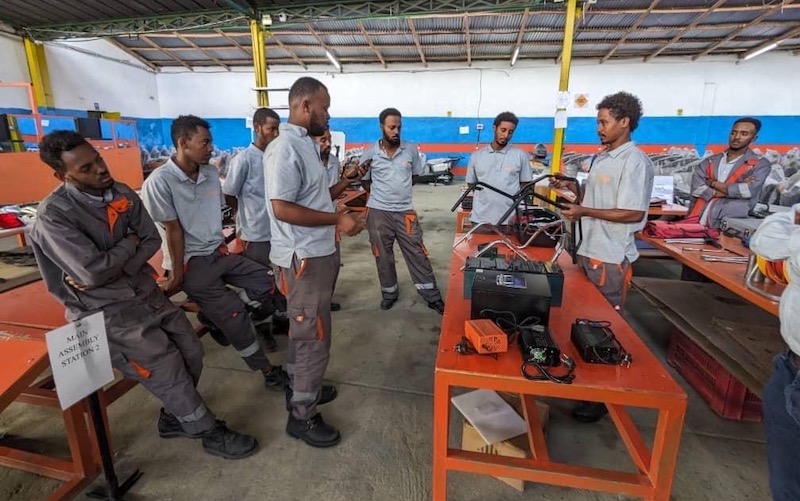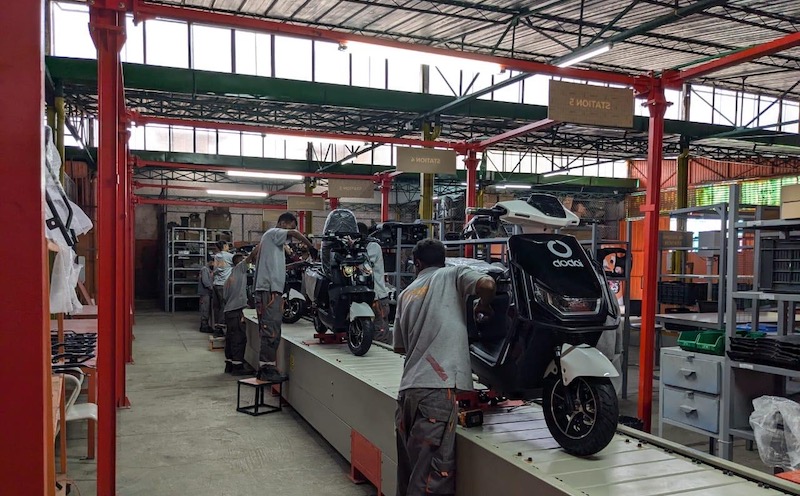Dodai caters to Ethiopia’s delivery drivers with electric 2Ws | Chat with CEO Yuma Sasaki

Dodai is an electric vehicle manufacturer based in Addis Ababa, Ethiopia. The company assembles electric 2Ws in Ethiopia and is one of the first few players in the market. The start-up also recently announced a strategic partnership with Ethiopian Investment Holdings (EIH), the country’s sovereign wealth fund, to install 100 battery swap stations in Addis Ababa within twelve months before moving to other major cities in Ethiopia.
We caught up with CEO Yuma Sasaki to learn about their work and his take on Africa’s overall electric mobility space.
Could you briefly share how Dodai started and what inspired you to establish this business in Ethiopia?
I’m originally from Japan and have a mobility background, including experience with Uber. I decided to start a business in Ethiopia because it’s the second-largest market in Africa by population. I realised that mobility was one of the biggest challenges here.
We received initial investment from Japanese investors and started about two years ago. We set up a small factory in Ethiopia to assemble bikes from parts imported from China. In the last eight months, we’ve sold about 700 electric 2Ws. We sell our 2Ws for around 200,000 Ethiopian Birr, which is nearly $1,700.

We are now the biggest player in Ethiopia, where electric 2Ws are new. We’ve also partnered with a sovereign wealth fund to establish hundreds of battery swap stations. In the future, we might expand to electric three-wheelers or launch a logistics app.
So far, we have a team of about 50 people, raised $7 million, and are seeking to raise another $10 million over the next six months.
Do you assemble the battery packs locally, or are the battery packs imported as-is from China?
Currently, we import finished 3.2 kWh LFP batteries as part of the bike. In the future, we plan to assemble the battery packs in Ethiopia locally.
What is the EV policy framework in Ethiopia?
There’s no subsidy push at the customer level compared to India. However, we have one significant privilege—no import duty on electric motorbikes, three-wheelers, or electric cars. The government supports EV adoption by imposing a hefty import duty of 200-300% on fuel-based vehicles. As a result, EVs are actually cheaper than fuel-based cars from the customer’s perspective.
Additionally, the import of fuel-based two-wheelers, three-wheelers, and cars is already banned, making it one of the first countries in the world to take such a step. Over the past six to twelve months, there’s been a rapid shift toward EVs.
What’s your distribution model in Ethiopia?
We sell exclusively through our physical showrooms. In the future, we will consider partnering with potential distributors who meet our criteria and are interested in selling our electric bikes. However, we don’t want to rush into a distributor model. That approach would make maintaining control over customer service harder, which is crucial for us.
We have three showrooms in Addis Ababa, the capital of Ethiopia, which has a population of about 7 to 8 million people. Since electric motorbikes are still new in Ethiopia, people prefer to see them in person. Customers visit the showrooms, where we explain the features and sell the bikes.
How many potential cities in Ethiopia do you see yourself expanding to?
We aim to focus on urban mobility rather than rural areas.
In Ethiopia, there are 7 to 8 cities with populations of 1 million, while Addis Ababa remains the largest. Our primary focus is to penetrate Addis Ababa first. Once we achieve that, we’ll expand to regional cities with populations of 1 million. Afterwards, instead of moving into rural areas, we’ll target other African countries, still focusing on urban areas.
Who do you see as the target audience for your vehicles?
Our primary customers are delivery drivers, including gig workers and delivery companies.
In Ethiopia, getting number plates is difficult for individual gig workers. The electric motorbike itself is still new in the country, and the concept of gig work is also relatively new. As a result, the government is being cautious and is initially allowing only businesses to get number plates to prevent the city from becoming chaotic. So, for now, we’re focusing on delivery drivers working for delivery companies.
The local government recently announced that they will soon allow individual gig workers to obtain number plates, so this change will likely happen within a few months. Once that happens, our focus will shift to gig workers.
In the future, when we introduce the battery-swapping model, gig workers will be our main customers.
How is the public charging infrastructure developing in Ethiopia?
First, our bikes can be charged at home outlets. In the city, there are no charging stations yet, but I expect that within the next six months, some companies will set up charging stations. Last month, the government approved the first-ever standards for charging stations, so now they’re open to foreign companies as well. I’m aware that some Chinese companies are already planning to set up charging stations on the roads.
Can you share the current penetration rates for different vehicle categories in Ethiopia?
I’m based in Addis Ababa, so I can share about electric vehicle adoption here. Currently, electric cars are being adopted faster than electric two- and three-wheelers. This is mainly because getting number plates for cars is much easier, with fewer bureaucratic hurdles. Electric cars and fuel cars are treated similarly in terms of registration.
On the other hand, getting number plates for two-wheelers and three-wheelers is more complicated at the moment.
Please share more about your plans to set up a battery-swapping network.
We plan to create a joint venture (JV) with an Ethiopian sovereign fund, which will own the battery and swap stations. In Ethiopia, all land belongs to the government, similar to what you might see in countries like Vietnam or China. The government’s role in this partnership will be to secure locations for the battery swap stations and ensure reliable electricity for those stations, as the state-owned electricity company is part of the sovereign fund.

Regarding the scale, we’ve already announced plans to set up 100 stations initially. Since this is an infrastructure business, it’s crucial to ensure a minimum level of convenience for customers right from the start. We plan to begin with 20 stations and scale up to 100 by the end of the year. While optimizing those, we’ll add another 300 stations by 2026, bringing the total to around 400.
Subscribe & Stay Informed
Subscribe today for free and stay on top of latest developments in EV domain.






